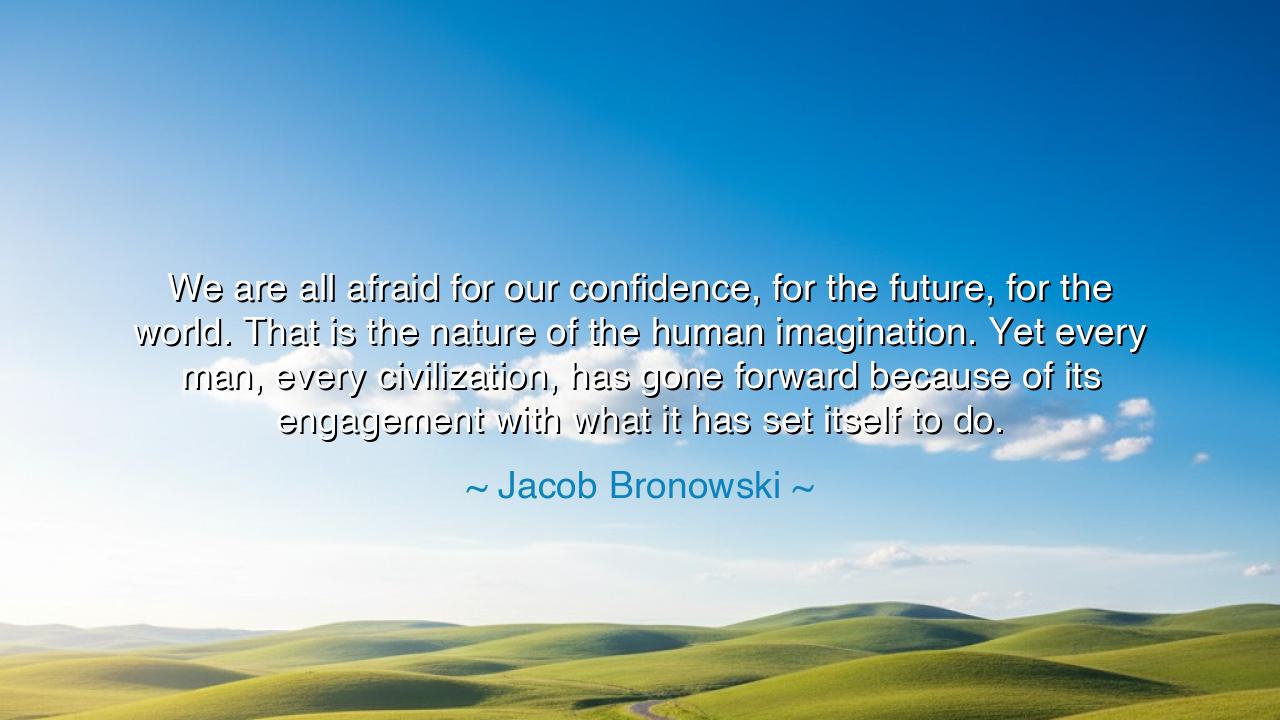
We are all afraid for our confidence, for the future, for the
We are all afraid for our confidence, for the future, for the world. That is the nature of the human imagination. Yet every man, every civilization, has gone forward because of its engagement with what it has set itself to do.






In the luminous and compassionate words of Jacob Bronowski, the philosopher, scientist, and poet of progress, we are given a truth that spans the ages: “We are all afraid for our confidence, for the future, for the world. That is the nature of the human imagination. Yet every man, every civilization, has gone forward because of its engagement with what it has set itself to do.” Here, Bronowski speaks not as a scholar alone, but as a sage who has witnessed both the greatness and the terror of the human condition. His words are a hymn to courage — the courage to imagine, to act, and to endure — even when the world trembles beneath the weight of uncertainty.
For fear is the twin of imagination. It is the shadow cast by our capacity to see beyond the present moment. Only beings who can dream of the future can fear it; only those who can imagine beauty can also foresee destruction. Thus, fear is not weakness — it is the price of awareness. The beasts of the field do not fear tomorrow, for they do not conceive of it. But man, endowed with imagination, stands between what is and what might be, forever haunted by both hope and dread. In this tension lies our greatness, for it is from the fire of fear that courage is forged, and from the shadow of doubt that progress emerges.
The origin of this quote lies in Bronowski’s lifelong reflection on the human spirit — its capacity for both creation and ruin. Having lived through the wars and witnessed the dawn of the atomic age, he understood that the same imagination which built cathedrals and symphonies also devised the engines of annihilation. And yet, he did not despair. In his masterwork, The Ascent of Man, Bronowski taught that human progress — moral, scientific, and artistic — depends upon our willingness to confront fear, not to flee from it. The civilizations that have risen in glory are those that dared to engage with their uncertainties, transforming anxiety into discovery, chaos into order, and peril into purpose.
Consider the voyage of Christopher Columbus, who set sail into the vast and uncharted ocean, armed only with conviction and courage. The sailors who followed him feared they would fall off the edge of the world; yet they went forward, driven by imagination — the belief in lands unseen and possibilities unproven. Or consider the scientists of the Renaissance, who, under threat of persecution, dared to look through telescopes and microscopes and saw a universe far greater than man’s conceit had imagined. They were all afraid — for their confidence, for their future, for the world — but they moved forward nonetheless. Their fears became the fuel of transformation, their doubts the soil of new beginnings.
Bronowski’s wisdom reveals a paradox: imagination is both the source of our fear and the instrument of our triumph. We tremble because we see too much — the fragile future, the risk of failure, the unknown that stretches before us — yet that very vision grants us the power to act. To be human is to walk through uncertainty with eyes open, to feel the weight of doubt and still choose creation over retreat. The civilizations that perish are those that surrender to fear; the ones that endure are those that transform it into vision. It is not the absence of fear that marks greatness, but the engagement with fear through courage, labor, and imagination.
So too in our own lives, this teaching holds true. Every man and woman who has built something meaningful — a home, a work of art, a new idea — has known the ache of doubt and the chill of fear. Yet they have pressed forward, not because they were unafraid, but because they understood that fear is the companion of growth. The artist faces the blank page, the builder faces the storm, the parent faces the future of the child — and all, in their way, enact the same ancient ritual: to engage with what they have set themselves to do.
Therefore, my child, take this truth to heart: do not wait for fear to vanish before you begin. It will never vanish, for it is woven into the fabric of your imagination. Instead, let it remind you that you are alive — that your spirit is reaching beyond itself. Stand firm in your purpose. Engage with your task, whatever it may be, not as one who is certain of success, but as one who is willing to strive despite uncertainty. For it is this engagement, this faithful act of doing, that carries both man and civilization forward.
And let the final lesson of Jacob Bronowski echo within you: the future does not belong to those who dream without fear, but to those who imagine and act in spite of it. For though fear is the nature of the human imagination, progress is the nature of the human heart. And every step forward — every bridge built, every truth sought, every kindness dared — is the triumph of that heart over its own trembling shadow.






AAdministratorAdministrator
Welcome, honored guests. Please leave a comment, we will respond soon